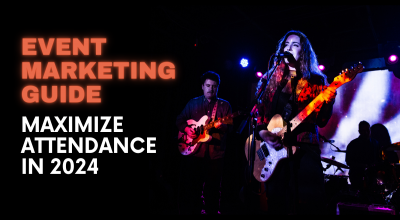Have a look at some of the other key things you need to consider:
1.Where is your event and where will your audience be coming from?
As you already know where your event is taking place, it’s quite easy to assess whether you can or should proceed with it. An event due to be held in a high-risk zone will not be able to proceed. But once the crisis is over and the area is deemed to be safe again, you will need to decide whether you want to hold it there or move it elsewhere.
As well as being clear on risk zones, it’s vital that you understand where your audience will be coming from. For example, you could spread the virus by holding an event in a safe area but not realising that your audience have been in infected areas. Without checking passports and asking people where they have been this becomes an operational challenge. Having said that, the SaaStr Annual 2020 is doing precisely that. They have some pretty strong entry criteria in place. They will be checking passports and using thermal scanning of attendees to ensure that they are healthy and can be granted access to the event.
Within the term audience, think not only of delegates, but also of VIPs, speakers, exhibitors, sponsors, contractors and other stakeholders that come into contact at the event. It can be too easy to focus on delegates and disregard the impact of other people that could spread the virus.
You can use your event management system to help identify and communicate with groups of people. For example, if you need to communicate something specific with people coming from affected countries or if you just need to identify how many people are coming from a specific area.
2. Who is coming to your event?
As well as understanding the demographics (the virus tends to have a higher risk impact for the elderly) of your event, what organisations are likely to come is another important factor for consideration. Senior leadership members or keynote speakers may be reluctant or unable to come.
In addition, a number of large companies are banning or significantly curtailing employee travel for an undetermined period of time.
3. What alternative event formats could you use?
Whilst not all live events, such as awards dinners will be able to be reconfigured, there are alternative formats such as live streaming (web-casting) events that you could consider.
For years now and due to the ongoing advances in technology, virtual meetings and webcasting events have been successfully delivered across the globe. Live steaming of events enables people to take part in an event without the need to leave their home or office. All that they need is an internet web link to the conference (event).
You could decide to stream your event and have limited audience engagement or you could design your remote event to fully immerse participants and get them involved in working together on case studies and exercises. It’s all possible with a little bit of design thinking. If you’re considering the move, have a look at some of the ways Eventsforce is helping organisers move their sessions and event content online.
4. Some decisions will be taken out of your hands
Despite your intention of holding your event you may find that other organisations impact on your decision-making process. For example, airlines cancelling flights on certain routes. Regional or national authorities taking decisions to close down all events or events of a certain size. Hotel chains, conference centres and other suppliers could all take decisions that are beyond your control but which mean that you cannot hold your live event if you want to.
5. Separate fact from fiction
Hard hitting headlines provoke emotion. When there is so much information on coronavirus coming from all directions, it can be easy to read the headlines and move on. But often, you need to read the article in full to understand the argument or opinion.
Media companies have their agendas to increase their circulation and readership figures. Bad news sells. It’s interesting to note, that media commentators have not mentioned in any depth, the slowing down of the virus and the recovery rates.
It’s important to ensure that the verifiable facts from independent bodies are used for the bulk of your decision making. Clearly, actions and opinions of others will also play their part.
6. Communicate clearly
It’s really important that in a time of uncertainty about what the virus could mean, that you keep all event stakeholders up to date with where you are.
Event management software can help you communicate with attendees effectively. You can use pre-scheduled emails, email alerts and if you have a live app already that people are using, you can push notifications through it.
Your event website is another area that will be key in communicating effectively with attendees. You can use it as a main signposting point. It could be used to talk about things you’re doing on-site to limit the spread of infection or whether you are re-scheduling or cancelling the event. Just be sure to let people know what’s happening. Communication is key especially in a time of crisis.
7. Managing your event on site
If you decide to hold your event as you have deemed it safe to do so, then it’s crucial that you undertake the necessary precautions to keep everyone safe. How rigorous these measures will be, depends on you and the relevant authorities. Some event planners are carrying on, with a business as usual approach. This doesn’t seem to take into account just how the virus can be spread. For example, banning handshakes and air kisses would seem to be the very minimal that organisers could insist on.
At the other end of the scale, there are cases where organisers are insisting that delegates wash their hands-on arrival and throughout the day as they attend sessions. It’s clear that different interpretations are being adopted by planners.
8. Is hotel accommodation your responsibility?
Given the ways in which the virus can be spread what is your view on how you should deal with the accommodation of delegates and stakeholders? For example, if you signpost delegates to housing options that are offered on your website does that mean you are taking responsibility for any issues at the hotel(s)?
Whilst it is good to have healthy relationships with hotels and venues do you want to be responsible (inadvertently) if they help spread the virus. For example, if their cleaning standards are not what you would expect, what will you do? Could you ask them to be more thorough in their cleaning duties or would that be a step too far?
Maybe you will need to make it clear to delegates that as the event planner you cannot be held responsible for the hotels’ cleanliness. But, if you make that statement, you will hardly be giving much confidence to your delegates. The key is always to manage expectations and have a clear understanding of what you are providing.
It would be useful to check what contracts and insurance policies you have in place. They could be very helpful, especially in the event of a dispute on responsibilities. Always check with your insurance provider as to the extent of coverage provided and whether you need to ask them for any changes.
9. What do you need to do after the event?
What will and should you do once the event has finished? The event went well, delegates, sponsors and other stakeholders said that it was a great success. But, once everyone has gone home what are your obligations? Is it just the case of issuing the post event survey or should you be doing anything extra? Clearly if someone has become ill during your event with the COVID-19 symptoms you would need to let the relevant authorities know.
According to the guidance for mass gatherings as published by the World Health Organisation “Meeting organizers must liaise with public health authorities and facilitate the sharing of information about all symptomatic participants (such as their itineraries, contact information, visa procedures, and hotel bookings)”. Whilst this information applies to large gatherings it can really be applied to any event regardless of size. You will just need to be sure that your event management system has captured the necessary information that will be requested by the authorities.
Keep up to date and work together
The position with COVID – 19 is changing daily. Advice provided today may change tomorrow (as more knowledge of the virus is gained). It’s imperative that you keep an eye with what is happening and how that could change your decision making.
Read widely, listen to podcasts, watch webinars (our industry associations are the best resource for this) and learn as much as you can about what you can do to lessen the impact of the disease. Look for lessons learned that you can take from other organisations’ experiences. The virus could potentially affect everyone. It has no boundaries. So look beyond the events sector for other initiatives to reduce the risk that you could apply to your event(s).
Make the most of your event management technology to access key information. Let the technology help you develop your event strategy. Share your experiences and insights with other event industry professionals and partners. Keep up to date, stay positive and remember you work in an incredibly resilient industry.
Article Credit : eventsforce




.png)
.jpg)

